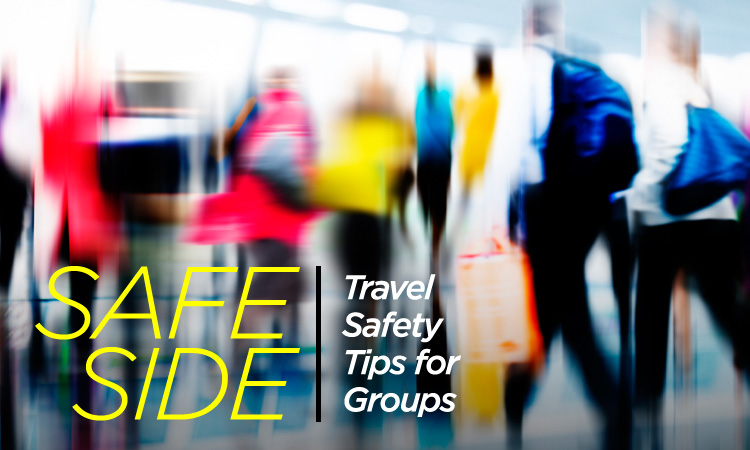Ruth Wikoff-Jones, CSEP, is a Senior Event Purchasing Manager for One10. Her responsibilities include designing meeting, event, and travel reward programs for Fortune 1000 clients, preparing budgets, researching and presenting creative program elements and enhancements, and also handling hotel and third-party vendor negotiations and procurement in support of the One10 sales organization. Ruth provides training and mentoring for new company associates. She also holds a Certified Special Event Professional (CSEP) certification, currently serves on the ILEA International Education Council, and has been a member of ILEA since 2003.
Safe Side — Travel Safety Tips for Groups
Editor interview with Ruth Wikoff-Jones, CSEP, Senior Event Purchasing Manager, One10
Group travel for business presents a host of complex challenges — budget, logistics, booking venues, etc. But in addition to all these considerations, these days planners must factor in the safety of their group. One10 Senior Event Purchasing Manager, Ruth Wikoff-Jones, has some insider perspective on the challenges and risks inherent in planning travel for groups.
Q. Tell me about One10 and what you do there.
A. One10 is a third-party event management company offering strategic management of meetings, events, and conferences for Fortune 1000 companies. As Senior Event Purchasing Manager, I work with the business development team to prepare budgets, research, find creative solutions for clients, and support the sales team.
Q. What are some of the biggest potential risks a corporate group may encounter when traveling together?
A. Weather can present a challenge. For example, the recent hurricanes that shut places down in Florida, Texas, and the Caribbean. Major disasters like these require additional efforts to move attendees who might be in the area, or cancel programs completely. On a smaller scale, we’ve had events planned for outside and because of the weather, had to move inside.
Then there are international incidents to consider — government coups, terrorism, and other events that are out of our control and present risks.
Additionally, many corporations may have a travel policy in place that states all company executives cannot travel on the same airplane together to mitigate risk in the event of an accident.
There are also concerns over health issues. Is the destination a place where there is outbreak of disease, such as the recent Zika virus or West Nile?
What is the infrastructure in the country? Are there hospitals available? What about the police or firefighting forces? You must think big picture when you think about risks—fire, floods--everything you can imagine has to be considered.
Q. What safety guidelines do you put into place before a group travel event?
A. The process can be extensive. At One10, it starts with my team and continues until every attendee is home safely. The process begins when we’re registering attendees. At that point, we get emergency contact information, so we can keep people informed in the event of an emergency. Then throughout the planning, we keep clients updated on potential risks. We try to stay ahead of questions they may be asking. For example, we recently had booked a charter flight for some clients around the time of Hurricane Irma. We were not entirely certain that the places they were traveling to would be able to even fly due to conditions, so we had to continuously monitor the weather warnings, so we could advise our clients and stay on top of their concerns. We also monitor State Department warnings for clients taking attendees out of the U.S.
From there, our event manager takes over planning and then passes off to the on-site staff and vendors. We maintain regular conversations with our vendors, checking in with them to see if it’s realistic to travel to their destination, then reporting back to our client to let them make the final decision about travel.
Q. Describe an emergency plan that you might implement before a group travel event?
A. The process starts at the point of site selection when we consider potential issues, such as weather — is it hurricane season? Is there a recent outbreak of disease? What are the risks? We then make recommendations to our client based on those risks. In the end, they may still choose to go.
During planning, we are constantly monitoring and communicating with vendors. Before our clients leave, we’ll make recommendations based on the information we’ve gathered, such as “always travel in groups,” “don’t leave the resort property,” or suggestions on what kind of clothes to bring based on the weather — things like that.
Then we have staff that travels to the destination with the attendees. Those staff members are briefed on all risks as well. They are there to answer attendee questions and be the conduit to advise attendees should something unplanned occur.
We also use mobile apps to push notifications on to attendees when they’re on site. And finally, we monitor our clients the entire time they’re traveling, checking to see where they are, arrival times, if they made it to their destination, etc. If there are issues, we work to solve the problems.
Q. Any other tips?
A. When planning group travel, you must think of the worst-case scenario. For example, what if an attendee gets lost? Have you established a point of contact? A place to meet if separated? A planner should also know what emergency resources are available too. Are the local hospitals within close proximity? Some clients prefer to travel with a physician, so that if something happens to attendees they can get medical attention from someone they trust. Police, pharmacy, fire — find out where they’re located. Know your resources. The most important thing is being prepared for potential emergencies. In our current environment, it’s important to have that at the forefront of your mind.










